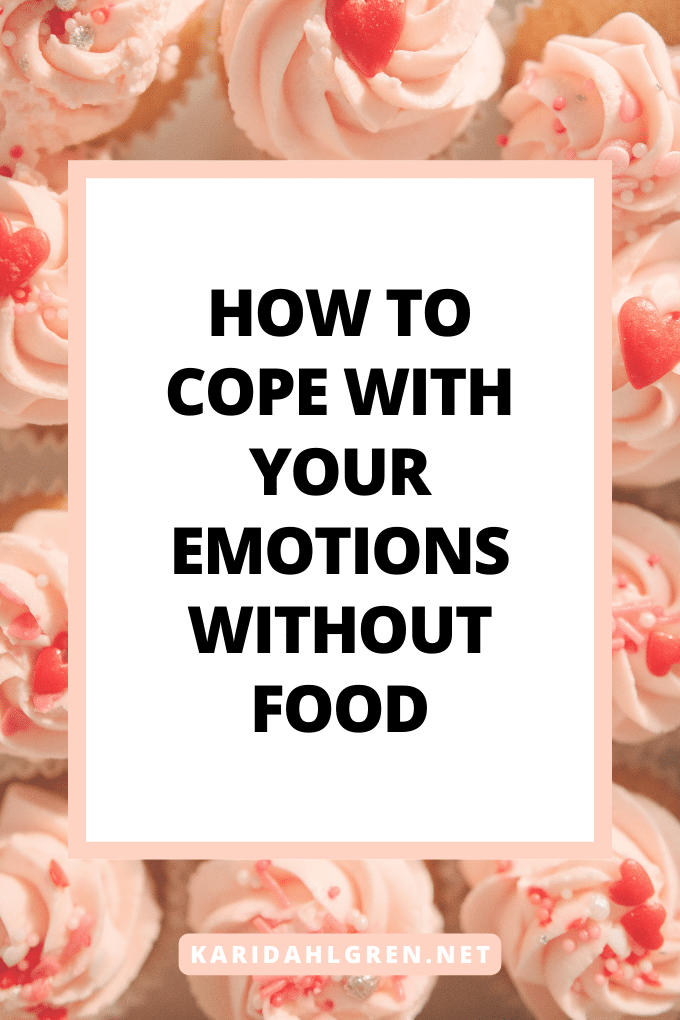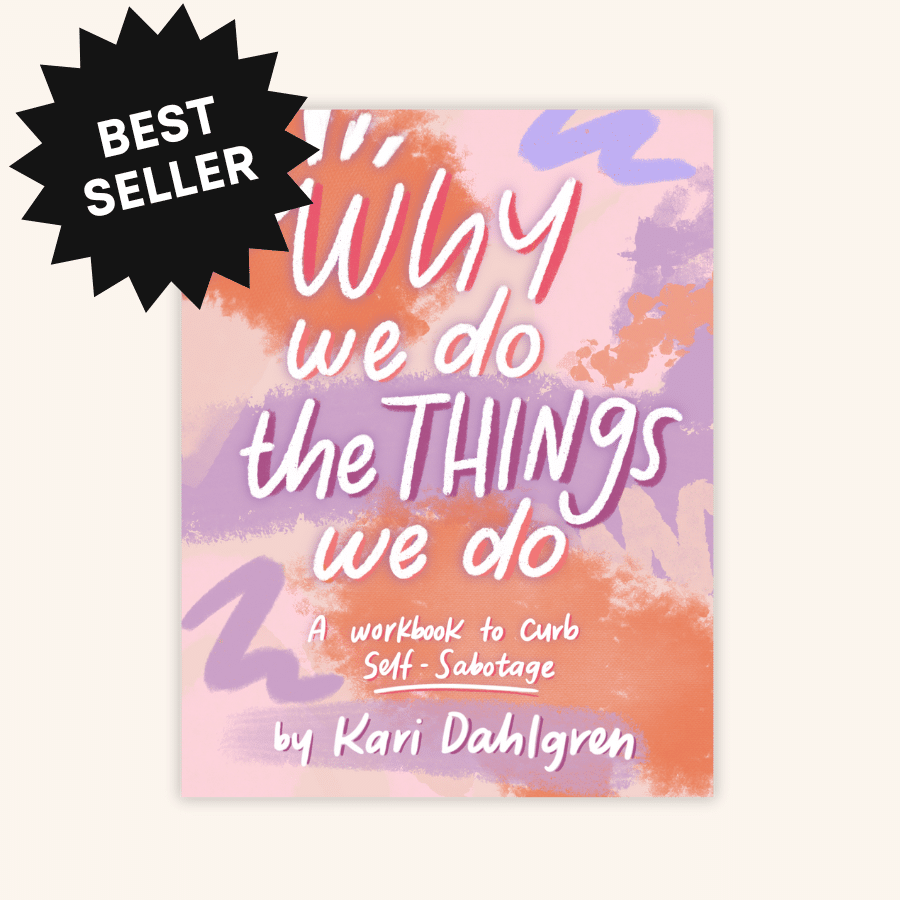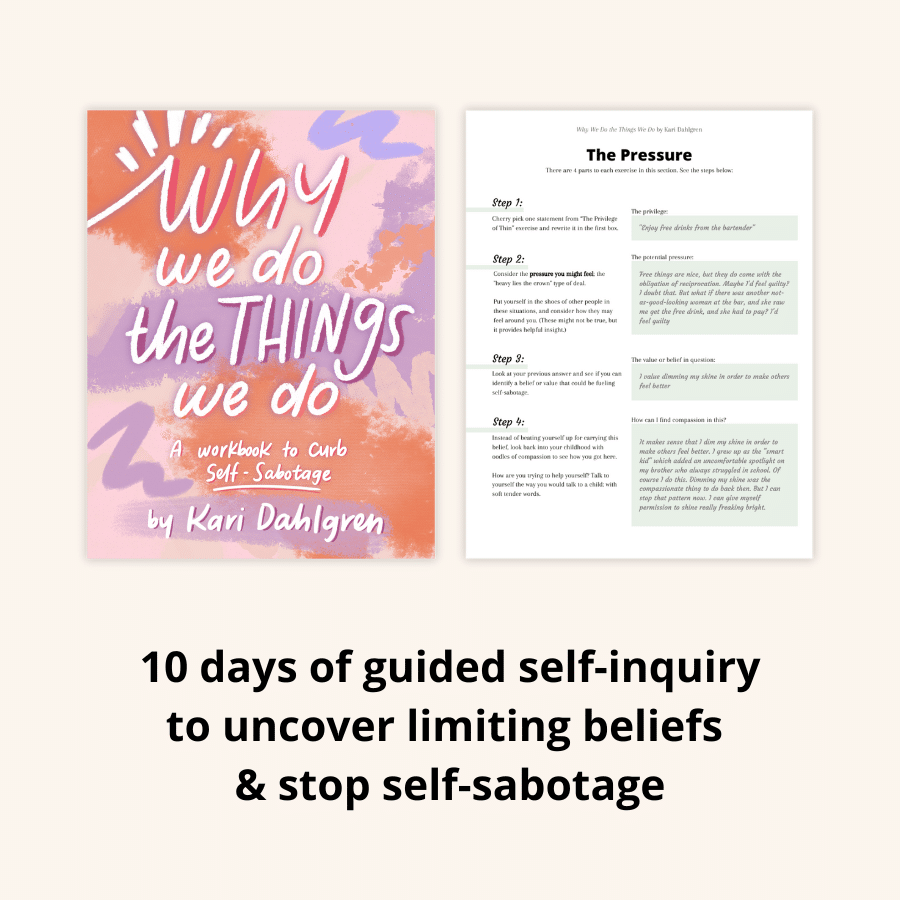
Food often becomes our go-to coping mechanism for discomfort because, unlike other indulgences, it’s a necessity. Because food is unavoidable, it can be challenging to learn how to stop using food as a coping mechanism, but it’s possible with the right tools.
Someone in a high-pressure work environment, for example, might deal with constant stress, and time scarcity can make it difficult to access non-food coping mechanisms like going for a walk or taking a nap. Pile these struggles on top of a snack shelf loaded with hyperpalatable goodies and you have a recipe for using food as a coping mechanism—and it’s understandable.
Reaching for food in times of stress is a normal human tendency, and you’re about to learn why. My hope is that by understanding the biological and psychological underpinnings of emotional eating, you’ll be able to access self-compassion, which is fertile ground for learning how to self-soothe without food.
In this guide, we’ll explore why food is such a tempting coping mechanism and how this psychological tendency is often intensified by the biological backlash of dieting. Then I’ll delve into some common triggers for emotional eating before providing you with actionable steps to help you learn how to stop using food as a coping mechanism.
Understanding Food as a Coping Mechanism
Food can be a comfort in stressful or emotional times, but when it’s used to soothe feelings instead of hunger, it becomes emotional eating—a way to cope with difficult feelings. A recent study published in the journal Nutrients found that emotional eating is significantly associated with psychological distress such as depression, anxiety, and stress, and it’s a risk factor for recurrent weight gain.[1]
Stress is a particularly significant trigger for emotional eating. A study published in the journal Clinical Nutrition ESPEN (European Society for Clinical Nutrition and Metabolism) found that 64% of 2,333 participants used food as a coping mechanism for stress; and as perceived stress increased, so did body weight.[2]
Stress itself is a difficult emotion that requires self-soothing. To perpetuate the problem, stress is also an appetite suppressant, blurring the lines between feelings of hunger and fullness.[3], [4] When internal cues are muted, it can heighten emotional eating and the use of food as a coping mechanism.
Another factor behind emotional eating is high dietary restraint, where individuals restrict their calorie intake in an attempt to lose weight. Dieting heightens stress, as it often requires counting and tracking everything that you eat, and it often causes feelings of deprivation when beloved foods are limited.[5]
Furthermore, reduced calorie intake is ultimately correlated with long-term weight gain, not weight loss, as the body rebels against undereating by deploying biological adaptations that motivate overeating.[6]
The biological backlash against restrictive eating, coupled with the emotional burden of dieting, amplifies negative feelings and the compulsion to use food as a coping mechanism.
Identifying Your Triggers Around Food
Now that you understand how food often becomes a maladaptive coping mechanism for uncomfortable emotions, it’s helpful to delve into the specific triggers behind this habit. By recognizing any patterns in your daily life, you take the first step toward learning how to stop using food as a coping mechanism.
Here are some common triggers for emotional eating according to clinical evidence:
- High Dietary Restraint: Restricting food and calorie intake not only increases cravings for hyperpalatable foods, but it perpetuates negative emotions like stress and feelings of deprivation. This can increase the urge to use food as a coping mechanism against these difficult feelings.
- Emotion Dysregulation: Struggling to effectively regulate emotions can trigger the use of food as a coping mechanism in attempt to self-soothe.[7] Emotion dysregulation is also correlated with binge eating.[8]
- Low Awareness of Internal Body Cues: Difficulty with perceiving internal body cues and sensations (“interoceptive awareness”) can make it challenging to distinguish between emotional hunger and physical hunger, leading to emotional eating.[7]
- Alexithymia (difficulty understanding and expressing emotions): Alexithymia is a condition characterized by difficulty identifying, describing, and expressing emotions, which can contribute to using food as a way to cope with unresolved feelings.[7]
- Depression and Anxiety: Emotional eating is often associated with depression and anxiety, as individuals may turn to food to alleviate symptoms.[1], [4]
- Stress: High levels of stress are correlated with emotional eating.[2] Not only does food offer a maladaptive way to self-soothe, but stress itself increases cravings for high-calorie, hyperpalatable foods, which are often associated with emotional eating.[9]
- Low-Nutrient Food Choices: Fast food consumption and other low-nutrient food choices are associated with emotional eating.[1] While fast food is not inherently bad and, like all foods, can fit into a healthy diet, reaching for fast food to numb negative emotions can perpetuate a maladaptive way of self-soothing.
- Poor Sleep: Poor sleep quality is associated with higher levels of emotional eating.[10] In a vicious cycle, negative emotions can cause poor sleep and emotional eating, and poor sleep can perpetuate more emotional eating.
As you can see, there are many triggers for emotional eating, and it’s a normal human reaction to use food as a coping mechanism from time to time. Learning how to stop using food as a coping mechanism requires intention and diligence, and it’s a journey worth taking to heal your relationship with food and your emotions.
How to Stop Using Food as a Coping Mechanism
Emotional eating often leads to feelings of guilt, shame, and physical discomfort, creating a cycle that’s hard to break. Now that you understand why food often becomes a coping mechanism and what the potential triggers are, let’s dig into the “how” of coping without food.
Here are some steps you can take to learn how to stop using food as a coping mechanism:
1. Identify & Swap Non-Food Coping Mechanisms
Short story: When possible, swap emotional eating with a non-food coping mechanism—and don’t stop there. This strategy provides accessible support but doesn't yet tackle the root issue.
Swapping food as a coping mechanism with a non-food coping mechanism is a beneficial step in managing emotional eating. While it doesn’t directly address the underlying emotions, it helps break the habit of turning to food for comfort. This is crucial for those still working on identifying and processing their emotions.
By finding alternative ways to soothe yourself without food, you reduce the reliance on food for emotional relief and take a proactive step towards healthier coping strategies.
Here are some alternative ways to soothe yourself without food:
- Exercise: Engaging in physical activity releases endorphins, which can improve mood and reduce stress.
- Creative Hobbies: Activities like painting, knitting, or writing can provide a creative outlet for emotions and reduce the urge to eat.
- Going for a Walk: A simple walk can clear your mind, reduce stress, and provide a healthy distraction from food cravings.
- Staying Busy: Keeping yourself occupied with tasks or projects can divert your attention away from emotional eating. Remember that this is a temporary fix meant to support you while underlying emotional issues are also addressed.
- Engaging in Social Activities: Spending time with friends or participating in group activities can provide emotional support and reduce feelings of isolation.
- Doing Things You Love: Pursuing interests or hobbies that bring you joy can boost your mood and lessen the need for emotional eating.
- Practicing Self-Care: Taking care of your physical and emotional needs through activities like meditation, yoga, or a warm bath can help you cope with stress in a healthy way.
- Playing with a Pet: Interacting with a pet can provide comfort and reduce feelings of loneliness.
- Taking a Break or Nap: Allowing yourself to rest and recharge can prevent emotional exhaustion and reduce the likelihood of turning to food for comfort.
- Practicing Time Management: Organizing your time effectively can reduce stress and prevent overwhelming feelings that may lead to emotional eating.
While swapping food as a coping mechanism for healthier alternatives is a valuable step, it’s essential to recognize that this is just the tip of the iceberg. To truly overcome emotional eating, a holistic approach is crucial—one that delves beneath the surface to address the underlying emotions and challenges driving this behavior.
2. Enhance Emotion Regulation Skills
Short story: Leverage emotion regulation tools to increase access to non-food coping strategies and decrease reliance on coping mechanisms over time.
When emotional eating feels compulsive, it can be difficult to choose a non-food coping mechanism. One skill that helps reduce compulsion and improve the accessibility of non-food coping mechanisms is emotion regulation.
Building emotion regulation skills involves developing the ability to effectively manage and respond to one’s emotional experiences without using food as a coping mechanism. Plenty of studies have found that poor emotion regulation is associated with overeating, emotional eating, and binge eating, highlighting the importance of this step.[8], [11]
Here are some strategies for developing emotion regulation skills:
- Mindfulness and Meditation: Practicing mindfulness and meditation can help increase awareness of emotions and thoughts, allowing for better management of emotional responses.
- Deep Breathing Techniques: Learning deep breathing exercises can help calm the nervous system and reduce the intensity of emotional reactions.
- Identifying Emotions: Becoming adept at recognizing and labeling emotions can make them easier to understand and manage.
- Journaling: Writing about emotions and experiences can provide an outlet for expression and help in processing feelings.
Stop, Drop, & Feel: The Stop, Drop, & Feel is my trademark tool for building emotion regulation skills, specifically in relation to stopping emotional eating. It involves stopping in the precise moment that you want to eat without hunger, dropping into your body, and allowing yourself to fully feel your emotions without resisting them.
The Stop, Drop, & Feel helps build emotional awareness and emotional tolerance, or distress tolerance, which is correlated with reduced compulsive eating.[12], [13] This paves the way to healthier ways of coping without food and, with enough time and repetition, diminishes the overall need for a coping mechanism, unlike merely swapping one coping mechanism for another.
3. Improve Connection with Internal Body Cues
Short story: Improving awareness of physical body cues helps improve emotion regulation through the mind-body connection.
Interoceptive awareness, the skill of sensing and interpreting internal bodily signals, is crucial for effective emotion regulation.[7] As you improve your ability to perceive body cues, you also deepen your understanding of your emotions. This highlights the importance of the mind-body connection on the path to learning how to stop using food as a coping mechanism.
By turning inward to identify bodily cues—such as identifying hunger and fullness cues—individuals can also become more attuned to their emotions.[12] This heightened awareness allows for better management of stress and emotional responses, reducing the need to turn to food as a coping mechanism.
4. Give Up Restrictive Dieting
Short story: To improve interoceptive awareness and stop using food as a coping mechanism, begin to rely on internal body cues to inform what and when you eat.
Moving beyond restrictive dieting is a critical step for those aiming to stop using food as a coping mechanism. Dietary restraint often heightens emotional eating, as it can induce feelings of stress and deprivation.
Additionally, dieting can make it challenging to improve interoceptive awareness. When you’re focused on external food rules, it’s difficult to tune into your body’s natural hunger and fullness cues.
Instead of adhering to strict dietary rules, listen to your body. This approach, known as intuitive eating, encourages you to eat in response to your body’s signals rather than external guidelines. Many people wonder if intuitive eating is healthy, and research supports its benefits. Studies have shown that intuitive eating programs lead to improvements in eating habits, lifestyle, and body image, as well as psychological health, with positive results sustained over time.[13]
By embracing intuitive eating, you can develop a healthier relationship with food, one that’s based on internal awareness rather than external restrictions. This shift not only helps reduce the use of food as a coping mechanism but also supports overall well-being.
Coping Without Food
Understanding and addressing emotional eating is a multifaceted journey that involves enhancing emotion regulation skills while reconnecting with internal body cues by giving up restrictive dieting. While it can be a big undertaking, there are many non-food coping mechanisms that you can rely on in the meantime.
As an eating psychology coach, I specialize in the thoughts, feelings, and beliefs that motivate our behavior around food. To learn more about my approach, check out my free resources available below:




I don’t feel like I have it in the bag I’m 69 years old and I’ve struggled with my weight all my life.
Thanks for sharing Beatrice. I can’t imagine the frustration you may feel, and I hope that the advice in this article helps you get started. You don’t have to nail it all at once. Even the smallest step is significant.
I just want to say thank you so much for your blogs. I’ve subscribed to alot of different thing to help with my emotional eating. Yours is the only one I read consistently. The way you present the science and then how to use it. Is so helpful thank you 🤍
What a compliment, Jasmine! Thank you! Sometimes I worry I get too technical with all the clinical studies, so I am glad to hear that it’s helpful. I celebrate your kind heart, and hope to hear from you again sometime. 🙂
Hi Kari,
I want to let you know that your valuable and compassionate content reaches all the way to the Netherlands. I stumbled upon one of your articles on Pinterest and thanks to you I gave up dieting. It’s a bumpy road, yet very beautiful and I’m grateful for your words and wisdom. Keep doing what you’re doing. We need voices like yours.
Aww, Lotte, thank you so much for your encouragement!! It means a lot that you took the time to let me know that this was helpful. My heart is filled with joy, and I count myself SO lucky that I can attract such wonderful, kind-hearted people like you into my world. I have no doubt that you are a source of light for many people around you! Likewise, keep on 🙂